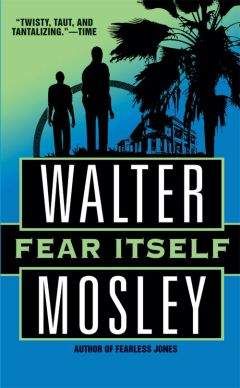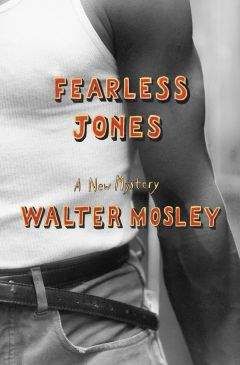Walter Mosley - The Long Fall
It worked beautifully. The cops busted the couple in the nude. They confiscated the briefcase and found the numbers connecting Tyner to the extortion scheme. They offered Bly a deal that he couldn’t refuse and Tyner went to prison.
It all went exactly as planned . . . but there was a problem.
Bill let his college certificate get him in trouble. Since he was better educated than all of his hoodlum friends, he thought he was smarter—than anyone. So he figured if we were getting fifteen thousand out of Marr, then Tyner would pay double. He went to a guy named KC Longerman to pass the plan (without our names attached to it) along to Tyner. But somewhere in Bill’s education he skipped the course that would’ve told him I was the one who introduced him to KC.
I went to Bill’s place, with murder in mind, the night after we put the plan in motion. Norman Bly was in police custody and Joe Tyner was soon to be a guest of the state. As far as I was concerned, this was also Bill’s last night of life.
His plan wouldn’t have worked. Tyner could have easily found out who Four-fingers had contracted with. But Bill thought he was too slick. He didn’t mean to get us killed.
I was so angry that murder was only a twitch away. But as I stood over him I realized that Bill’s betrayal was my fault. Men like Bill and me should never have been partners, not in the long-term straight-world way of contracts and agreements. We weren’t businessmen. We were independent agents out for ourselves by necessity, and by nature. Bill didn’t see any problem with getting a little on the side. As long as I didn’t know and wasn’t hurt, what did I have to complain about?
I left his apartment door ajar, with a hollow-point .45-caliber bullet standing like a soldier on his breakfast table.
We haven’t crossed paths since.
I REMEMBERED BILL because even though I have eschewed partnership since that time, I am still, as Harris Vartan noted, not completely self-sufficient. With the police knocking on my door, dead men in my wake, and killers studying my name, I knew that I had to get my butt in gear and head way downtown, where the laws of nature and the laws of man intersect, intertwine, and make up a whole new system of justice.
Ê€„
29
In spite of my sporadic fantasies about foreign climes, the only city I could live in is New York. Most other American municipalities are segregated by class and culture, education and personal choice. But in New York everybody is jumbled up together and bounced around until you have African princes walking side by side with Appalachian Daughters of the American Revolution, and aspiring starlets îp tmaking room for hopeful housewives past their prime. Even with real estate costs climbing above the reach of almost everyone, you can still find all the elements of humanity riding the number 1 train down under the West Side of Manhattan.
There were at least a dozen readers in the car I rode on the trek toward Wall Street. They perused novels and textbooks, newspapers and hip-hop magazines. There were displaced housewives going to work because one income didn’t pay the rent anymore. Many of these watched their soaps on tiny screens plugged into earphones. That afternoon I saw books by Thomas Mann, Joy King, Edwidge Danticat, and Danielle Steel being read. One dusty fellow kept turning his head suspiciously, looking for enemies that might be sneaking up on him. A chubby white woman smiled at me and even pursed her lips. At one point a troupe of doo-wop singers composed of one Asian and three blacks made their way through our car, crooning “On Broadway” and “Up on the Roof.”
There were two middle-aged women sitting across from me, one black and the other white. They were laughing and chatting happily about work. It seemed that a supervisor who had been leaning on them had an affair with a secretary who was also fooling around with the big boss.
“Honey, when he came out of Metcalf’s office he was white as marshmallows,” the black woman was saying.
She was having such a good time that she didn’t notice the little guy in the unremarkable clothes sitting next to her on the bench. He wore tan trousers and a navy shirt. His once completely yellow head of hair now was layered with differing shades of dirty gray. His back was almost fully turned to the black woman but somehow Regular Joe’s elbow had jostled her big blue purse so that it fell partly open.
The next step would have been for him to get up when the train came close to a stop. That way, when the brakes were applied, he could pretend to fall off balance and make a fast grab. People in his profession had good hand-eye coordination and great dexterity.
Maybe fifteen seconds before the process was to begin I coughed. In the pickpocket’s ear I might as well have yelled, “Stop thief!”
He looked up at me and I shook my head ever so slightly.
He smiled and nodded, got to his feet, and moved on down the line.
“Ma’am,” I called across the aisle.
“What?” the chatty black woman said in a markedly unfriendly tone.
“Your bag is open.”
Her reaction was completely predictable. First she grabbed her purse and searched it. A red wallet floated near the top. But there was also her cell phone and MP3 player to check out. She cinched the bag shut and glared at me for a second and a half, wondering if somehow I had tricked her. The defiant stare then melted into contrition and she finally, reluctantly, said, “Thank you,” as if I were a mischievous child who just pointed out that her underwear was showing.
THE ARCHITECTURAL EQUIVALENT of the nondescript pickpocket was a gray-walled building a few blocks north of where the World Trade Center used to stand. There were no guards or doormen in the lobby, and the man I was looking for didn’t have his name or title on the sparse directory.
By way of the stairs I entered into a dull green corridor on the seventh floor and turned right, following the slender hallway past five doors to offices that were permanently locked. It was only the unremarkable sixth door that had any life behind it.
I knocked and waited. A minute went by but I didn’t knock again. Another minute passed and I waited patiently. A few seconds later there came a loud click. The portal eased open on its own and I walked in.
THE ANTECHAMBER TO the Important Man’s office was as bare as an office can get while still serving a function. There was a maroon metal desk with a no-frills swivel chair behind it and another folding chair set up in the corner. There were no paintings on the light-green walls, no carpeting on the unstained but sealed pine floor. There weren’t even any light fixtures, just two high-wattage stand-up lamps set in opposite corners.
Behind the desk was seated, as erect as a high school teacher in a Norman Rockwell painting, an effeminate, forty-something black man wearing gold-rim glasses and no smile. His burgundy necktie was thin enough to qualify as string and the black suit was tight fitting with stingy lapels.
This man was Christian Latour.
As I have said before, this was the year 2008, and race, though still a major player in American culture, had undergone a serious transmogrification. A black man was running for president. There was a legally blind black man in the governor’s seat in Albany. White American children and adults had heroes from Snoop Dogg to Tiger Woods. This wasn’t the age of being pushed to the back of the bus or excluded from the awareness of the media.
Seeing this arrogant and thin Cerberus before me, I remembered my father once telling me, “There is no greater slave name than Christian. Bill and Robert and Joseph and Dorothy are all equally qualified slave names. Any name that reflects the conqueror is a nod to his superiority. But to take his religion as your appellation is like falling down on your knees before him.”
My father had never met Christian Latour. This man was the epitome of defiance. He hadn’t so much taken on the name but rather he took it away from the people who once owned it. He sat like a Catholic cardinal in that simple throne, and you would never call him subservient or a victim.
“Mr. McGill,” he said, neither in greeting nor as a question. It was just a comment.
“Mr. Latour,” I responded.
“You don’t have an appointment.”
“I didn’t hó"3"fonave the leisure to make one.”
I liked Christian. He was so righteous in his monklike cell. He had one of the most important jobs in the Western Hemisphere and even though no one knew it he was in no way nonplussed by this anonymity. He was satisfied in his own skin, and that was a rare feat for any American.
Even though I liked him, Mr. Latour did not approve of me. I was coarse and gruff, listening to barrelhouse blues while he dreamed in operatic splendor.
There was a black box on Christian’s metal desk. There was a small aperture in the top through which light of any of the primary and secondary hues of the color wheel could shine. The hole shone a brilliant blue. Christian glanced at it and let his lip curl slightly.
“Mr. Rinaldo will see you now.”
Ê€„
30
Where Christian’s cubicle was barren and undersized, his boss’s grand hall of an office was a study in opulence. Thick burgundy carpets ran between royal-blue walls upon which hung Renaissance masterpieces lit from the ceiling by spotlights, artwork on loan from the Metropolitan Museum of Art (which has a policy of not lending out its possessions).
Ten steps into the room I passed a fully stocked mahogany bar built into the wall on the right. Across the way, on the left, was an altar carved from a solid block of apple-green-and-white jadeite. This sacred stand was tall as a man and twice as wide. Images of faces and animal forms, gracefully understated, flowed across the priceless sculpture.
There was no window, no portal to the outside world, but a green, red, and blue songbird with long, drooping feathers sang out gloriously as I passed. It was a greeting, or possibly a warning, but regardless the tune subsided before I had taken the final twenty-three steps to Alphonse Rinaldo’s desk.
He was standing behind a dining-table-sized piece of furniture made from a single plank of unfamiliar dark wood. He always stood when I entered the room. Maybe he did that with everyone—I don’t know.
Alphonse was of medium height (that is to say an inch or three taller than I), with flawless medium-white skin, black hair, and hard dark eyes. To the casual observer he might have seemed to be of a mild temper, but many of the worst monsters I’ve known were like that: pleasant even in the regrettable act of murder.
His hair, which was neither long nor short, was perfectly coiffed, and his suit would have turned Giorgio Armani’s head.
“Have a seat, Mr. McGill.” If quicksilver could talk it would sound like him.
The chair I preferred, Alphonse had once told me, was pre-Columbian, carved from a single piece of volcanic rock.
“It was used for sacrifices,” he’d said on that day a few years earlier. “There was a tray that lö
I suppose I must have looked a little uncomfortable, because he added, “Don’t worry, Mr. McGill, it was used exclusively on virgins.”
I had once asked Rinaldo if he answered directly to the mayor.
“I am the special assistant to the City of New York,” he answered as if there were a grim god that lived under the stone and steel, concrete and grime, of the city, a god whose will carried more weight than any politician or generation of voters.
And if Manhattan was an ancient deity set to oversee our island and its neighbors, then Alphonse Rinaldo was an errant angel thrown down among swine. He could buy your soul from a third party and send it twirling like a glass top on the granite stairs of justice. He was without peer, the most dangerous man in New York City. And he almost always knew more than anyone else in the room.
I HAD DONE the special assistant a favor some years before. There was a certain gentleman named Todd who had so much money that he owned a sprawling single-story home set atop a midtown skyscraper and encased in one-way glass. He could see out but the world could not see in.
Todd’s daughter was in love with a man the family considered beneath them. I was brought in to incriminate the gentleman in question. They had considered “other means” of dealing with the problem, but in the final analysis Todd didn’t want his daughter to suffer distress.
Alphonse asked me to find or manufacture evidence that would convince the daughter of her lover’s turpitude (Alphonse’s word, not mine). It was a complex job because even though the boyfriend may have been seen as low class by the Todds, he belonged to another kind of family that wielded a great deal of very raw, very physical power.
Alphonse was well aware of the situation and had reasons within reasons for me to be successful, and not . . . but that’s another story.
In the end no one was happy, but I had made a connection with the Important Man, and so from time to time I did him favors, and he paid me back in kind.
I hadn’t seen Rinaldo since deciding to go from crooked to only slightly bent, so it was a tricky business, me asking for a favor today when I might well have to turn him down tomorrow. But the way I saw it, I had to live through today in order to suffer the ramifications of later on.
“WHAT CAN I do for you, Mr. McGill?” Rinaldo was all about the business. If he had friends, I wasn’t one of them. He didn’t care about my health or my day.
“I need to find one guy and get to another one.”
“People I care about?”
“I doubt it.”
<û hecar/div>
“People that matter to the city?”
“Maybe. It might be that I can help your people clean up one mess and get myself out of another one.”
I respected his receptionist, Christian, that’s a fact. He was one of a kind, a man who lived in his own estimation of the world. People like him were the only real people, in my opinion. I respected Christian but I was, in spite of myself, in awe of Alphonse Rinaldo. The secretly ordained city manager had a preternatural aura around him. He never wasted a movement, or a word. Sometimes he did things that I didn’t understand, but I knew there was a good reason behind his every action, or inaction.
He didn’t ask me what I meant. He just waited for the evidence to make itself known.
I was good but not on the level of Alphonse. I had made it all the way to his den, but I still had doubts.




